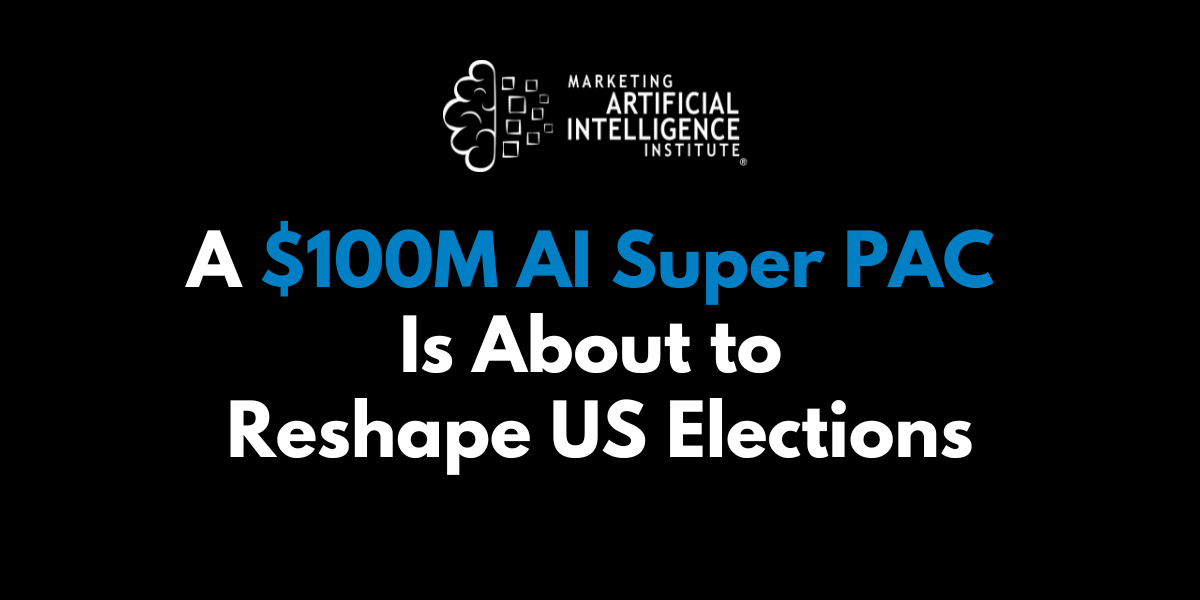In what could become one of the most consequential political storylines of 2026, Silicon Valley is mobilizing for political battle and its chosen front line is AI.
This week, a new AI-focused super PAC, Leading the Future, emerged with more than $100 million in backing. Its stated goal? To fund pro-AI candidates and fend off what it sees as regulatory overreach that could stall American innovation.
Is AI about to become a lightning rod during the 2026 US midterms? I broke it down with SmarterX and Marketing AI Institute founder and CEO Paul Roetzer on Episode 165 of The Artificial Intelligence Show.
The Rise of the AI Super PAC
Leading the Future is no ordinary PAC. It’s a super PAC, which in the US means it can raise unlimited amounts of money and spend freely, as long as it doesn’t directly coordinate with candidates.
Among its high-profile supporters are venture firm Andreessen Horowitz, OpenAI President Greg Brockman, and a coalition of tech titans who view AI regulation not just as a policy issue, but an existential threat to progress.
And it’s already aiming to make its mark in four key battleground states: New York, California, Illinois, and Ohio.
Its pitch? The AI industry doesn’t want free-for-all deregulation. But it does want guardrails that make sense. What it fears is a patchwork of conflicting state-level laws or overly cautious rules that could cripple momentum.
As the group’s leaders put it in a statement included in The Wall Street Journal:
“There is a vast force out there that’s looking to slow down AI deployment, prevent the American worker from benefiting from the U.S. leading in global innovation and job creation and erect a patchwork of regulation. This is the ecosystem that is going to be the counterforce going into next year.”
In other words, this isn’t about minor policy tweaks. It’s about winning the AI future and avoiding what they view as a catastrophic slowdown.
A Manifesto for the Movement
The philosophical engine behind all this? According to Roetzer, it’s The Techno-Optimist Manifesto released by Andreessen Horowitz in 2023.
Penned by Andreessen Horowitz co-founder Marc Andreessen, the manifesto reads like a rallying cry for unfettered innovation. It champions growth, technology, and human ambition. It also makes a stark claim: that slowing AI is not just misguided, but it’s actually morally wrong.
“We believe any deceleration of AI will cost lives,” Andreessen writes in the manifesto. “Deaths that were preventable by the AI that was prevented from existing is a form of murder.
This worldview shapes the PAC’s approach. The goal isn’t to tinker at the edges. It’s to secure a regulatory environment where AI can flourish without fear of premature restriction.
“If you don't understand what Andreessen Horowitz is doing, if you don't understand what this super-PAC is all about, this about sums it up for you,” says Roetzer.
A New Kind of Political Arms Race
If this all sounds unprecedented, that’s because it is.
The AI industry is drawing a line in the sand, and it’s doing so with money, messaging, and manpower. With the memory of the European Union’s recent AI restrictions still fresh, including limits on compute and model scale, US tech leaders are signaling that they won’t let the same thing happen here.
Instead, they’re betting big. Brockman, who has never publicly dipped into political waters before, is in. Andreessen Horowitz, which has openly aligned with the Trump administration, is all-in. And Silicon Valley appears to be coalescing around a shared mission: to protect the pace of AI advancement at all costs.
“The midterms in the US are going to be ground zero for AI,” says Roetzer.
What Comes Next?
If Leading the Future succeeds, it could establish a new model for how industries influence elections. If it fails, it may signal rising public and political resistance to unchecked tech power.
Either way, the stakes couldn’t be higher.
As Roetzer puts it:
“They will fight to win this, and they have the backing of the richest people in the world to do it,” he says. “They believe they have to win at all costs, no matter who that puts in office.”
Mike Kaput
Mike Kaput is the Chief Content Officer at SmarterX and a leading voice on the application of AI in business. He is the co-author of Marketing Artificial Intelligence and co-host of The Artificial Intelligence Show podcast.


